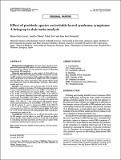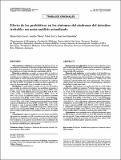Por favor, use este identificador para citar o enlazar a este item:
http://hdl.handle.net/10261/217847COMPARTIR / EXPORTAR:
 SHARE
BASE SHARE
BASE
|
|
| Visualizar otros formatos: MARC | Dublin Core | RDF | ORE | MODS | METS | DIDL | DATACITE | |

| Título: | Effect of probiotics on symptoms of irritable bowel syndrome: A meta-analysis updated | Efecto de los probióticos en los síntomas del síndrome del intestino irritable: Un meta-análisis actualizado |
Autor: | Ortiz-Lucas, M.; Tobías, Aurelio CSIC ORCID; Saz, P.; Sebastián, J.J. | Fecha de publicación: | 2013 | Editor: | Aran Ediciones | Citación: | Revista Espanola de Enfermedades Digestivas 105: 19- 36 (2013) | Resumen: | Background and objectives: immune system alteration in irritable bowel syndrome (IBS) patients may be modulated by probiotics. We assessed the efficacy of some probiotic species in alleviating characteristic IBS symptoms. Material and methods: a meta-analysis of all identified randomized controlled trials comparing probiotics with placebo in treating IBS symptoms was performed with continuous data summarized using standardized mean differences (SMDs) with 95% confidence intervals (95% CIs), where appropriate. The randomeffects model was employed in cases of heterogeneity; otherwise, fixed-effects models were used. Results: meta-analysis was performed with 10 of 24 studies identified as suitable for inclusion. Probiotics improved pain scores if they contained Bifidobacterium breve (SMD, -0.34; 95% CI, -0.66; -0.02), Bifidobacterium longum (SMD, -0.48; 95% CI, -0.91; -0.06), or Lactobacillus acidophilus (SMD, -0.31; 95% CI, -0.61; -0.01) species. Distension scores were improved by probiotics containing B. breve (SMD, -0.45; 95% CI, -0.77; -0.13), Bifidobacterium infantis, Lactobacillus casei, or Lactobacillus plantarum(SMD, -0.53; 95% CI, -1.00; -0.06) species. All probiotic species tested improved flatulence: B. breve (SMD, -0.42; 95% CI, -0.75; -0.10), B. infantis, L. casei, L. plantarum(SMD, -0.60; 95% CI, -1.07; -0.13), B. longum, L. acidophilus, Lactobacillus bulgaricus, and Streptococcus salivarius ssp. thermophilus (SMD, -0.61; 95% CI, -1.01; -0.21). There was not a clear positive effect of probiotics concerning the quality of life. Conclusions: some probiotics are an effective therapeutic option for IBS patients, and the effects on each IBS symptom are likely species-specific. Future studies must focus on the role of probiotics in modulating intestinal microbiota and the immune system while considering individual patient symptom profiles. © 2013 ARÁN EDICIONES, S. L. | Versión del editor: | http://dx.doi.org/null | URI: | http://hdl.handle.net/10261/217847 | Identificadores: | issn: 1130-0108 |
| Aparece en las colecciones: | (IDAEA) Artículos |
Ficheros en este ítem:
| Fichero | Descripción | Tamaño | Formato | |
|---|---|---|---|---|
| original4.pdf | 248,27 kB | Adobe PDF |  Visualizar/Abrir | |
| es_original4.pdf | 259,78 kB | Adobe PDF |  Visualizar/Abrir |
CORE Recommender
Page view(s)
117
checked on 05-may-2024
Download(s)
50
checked on 05-may-2024
Google ScholarTM
Check
NOTA: Los ítems de Digital.CSIC están protegidos por copyright, con todos los derechos reservados, a menos que se indique lo contrario.
